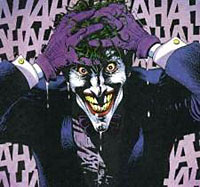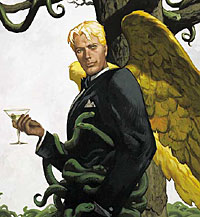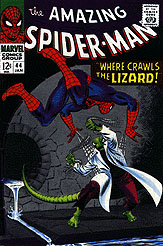>> Triple A: Urban Legend
>> Letter from the Editors
More...

This month, the Ninth Art editorial board convened its drunken meeting in the venue normally reserved for the Secret Rulers of the World. Their chosen theme? Eeeeviil.
ANDREW WHEELER: With action movie like ROBOCOP or the James Bond movies, the villains tend to get referred to as 'comic book villains', because they are simplistically drawn. They don't have realistic moralities, they're just plain evil. That's what we think of when we hear the phrase 'comic book villain'. Is this fair to comic books?
ALASDAIR WATSON: My immediate answer to that would be no. The two examples that spring immediately to mind are Lex Luthor and the Joker. And I know those don't seem like good examples.
ANTONY JOHNSTON: Explain yourself!
WATSON: I'm going to. The Joker is not evil for the sake of it, the Joker is mad, and it is a very clear distinction to draw. He only works as a villain because he's Batman's villain. The Joker is chaos to Batman's order, although that's a bit simplistic.
WHEELER: The Joker has never been a convincing villain to me, because he's mad. Unless you explore the psychology of that, you're just using 'He's mad, he is' as another version of 'He's evil, he is'.
WATSON: Oh, absolutely. The Joker is very easy to do badly.
JOHNSTON: Mad has often been used as a substitute word for evil.
WHEELER: It's like saying, his origin is, he's a mutant. He's evil because he's mad. And now the writer doesn't have to do any more work. And most of Batman's rogue's gallery are 'mad'. There's even an asylum in the comic!
WATSON: Let's be fair, this is because Batman himself is mad.
WHEELER: But that's a modern invention.
 JOHNSTON: Yes, that in itself is revisionist.
JOHNSTON: Yes, that in itself is revisionist.
WATSON: But at the same time, the term comic book villain has only been in use for the past twenty-odd years.
JOHNSTON: I think it's interesting that it's been used prolifically over the past fifteen or so years, and that's over a time when many people stopped reading comics, when the audience shrunk down to this hardcore readership.
WHEELER: It's a patronising, dismissive term, there's no question of that.
JOHNSTON: But it's based on the perception of comics by the general public. I think it probably is true up to that point, because it's only at that point that we started to get these modern revisionist ideas and explorations of why somebody was evil. Up until then it was enough for the majority of the audience for them just to be evil.
WATSON: I'm pretty sure Lex Luthor has had a good motivation in place for a lot longer than fifteen years. He thinks Superman is a bad idea. He thinks Superman destroys the concept of the achievement of the ordinary man.
JOHNSTON: Is that sort of motivation true, though, of comics outside of the past fifteen to twenty years?
WHEELER: The phrase comic book villain exists to create this opposition to the idea of a real life villain, and when you think of the phrase 'real life villain', you're kind of left scrambling for examples. You may think of Osama bin Laden or Hitler. In real life, villains don't really exist.
JOHNSTON: In real life, neither do heroes.
WHEELER: I suppose that's true. In STORY, Robert McKee said no one believes they're evil. No one believes that what they think is evil. And that's the cliché of comic book villains. They do think that they're evil. They're people who cackle and kill their own lieutenants. Another villain who did have a decent motivation more than fifteen years ago is Magneto. He's a militant civil rights activist. Once again I'm citing Chris Claremont as an example of things going right.
WATSON: To be fair, as soon as you look back twenty years ago you're forced to look to Claremont. Depressing, isn't it?
WHEELER: He was and remains an extremely important and influential figure in the history of comics, because he was the most successful and most influential superhero author of the last twenty years.
'Comic book villains are people who cackle and kill their own lieutenants.' WATSON: It's only in the past few months that the industry's top-selling title has shaken off his influence.
WHEELER: Magneto's motivation was there in the early stories, but at the same time he surrounded himself with a group called The Brotherhood of Evil Mutants, which they later claimed was 'ironic'. Which is ridiculous. You don't ironically call yourself the evil anything. But Magneto believed in what he was doing. In the same way, actually, that Hitler and Osama bin Laden believed or believe in what they were doing. Villains aren't evil to themselves. Magneto is not a comic book villain, even though he's a villain in a comic book.
JOHNSTON: And dresses like one.
WHEELER: Osama bin Laden doesn't think he's a villain. He thinks George Bush is a villain. To our point of view, of course, they're both villains. Which just goes to show you that, you're right, there are no heroes.
JOHNSTON: There are no real heroes, there are no real villains, but the public's perception of comic books is of a very black and white morality. When anybody who doesn't read comics refers to something as a 'comic book' whatever, what they mean is that it has a very simplistic black-and-white morality to it. And that's just not the case. It's because these people don't read comics. There are many comics that have grey areas, but people won't have read them.
WATSON: Let's look to some more sophisticated villains then.
JOHNSTON: But they're not villains. They're antagonists.
WATSON: Let's look to some more sophisticated antagonists, then.
WHEELER: Villains or antiheroes or antagonists can't usually lead books, but the recent exception to the rule seems to be LUCIFER, where the hero is a villain.
WATSON: But the thing is, the Lucifer they've cast is Milton's Lucifer.
WHEELER: He was still the villain, he was just sexier than God.
 JOHNSTON: Andrew's got a very good point. Lucifer, traditionally, is the villain. By definition, he is the adversary.
JOHNSTON: Andrew's got a very good point. Lucifer, traditionally, is the villain. By definition, he is the adversary.
WHEELER: Or, more accurately, the villain is traditionally Lucifer.
JOHNSTON: Carey has done an incredible job of making you realise that this Lucifer believes in what he's doing and is doing what he thinks is right.
WHEELER: It's a matter of perspective. To make a villain a lead character, you've got to give him an antagonist. I've said before, if Chuck Dixon were to write PUNISHER again, he says he would create a Van Helsing to his Dracula. Dracula only works with a Van Helsing. A villain only works as a lead if he's got a villain.
JOHNSTON: Someone who opposes him.
WHEELER: His philosophical antagonist. Because that's all it is with the heroes. With Batman's enemy being Joker.
WATSON: You could write a different version of the Batman mythos with only minor changes to make Batman an out-and-out villain and Joker some kind of hero. Grant Morrison had a shot at a variant on it in DOOM PATROL, where he was forced to kill off the Brotherhood of Da-Da, because he liked writing them more than the heroes.
JOHNSTON: That's a bit of a truism. Many writers have complained of that.
WHEELER: It's Milton's Lucifer again. Milton didn't mean to make the devil the best character in PARADISE LOST, but he couldn't help it, because he's the character that's complex, and God isn't. God is a really dull character.
WATSON: "I'm right. Look at me! Look at how right I am!"
WHEELER: It would be sacrilege for someone with Milton's beliefs to write God as being in any way flawed. Of course he's a tedious character, he's the Superman of PARADISE LOST. God as boy scout. Immediately Lucifer becomes so much sexier and more charismatic. He has all the best lines. All the best musicians!
JOHNSTON: Getting beyond fantasy and superhero comics, what about villains or bad guys in more realistic fare, such as TRANSMETROPOLITAN?
WATSON: Funnily enough, the villain in TRANSMET is its weak point. I can't stand The Smiler.
WHEELER: Tony Blair as arch-nemesis.
'With minor changes you could make Batman the villain and Joker some kind of hero.' WATSON: The trouble is, he's not Tony Blair. If he'd left him as Tony Blair I'd have been quite happy. There's an issue where the end of it has the Smiler sitting at his desk pulling the legs off a spider and cackling.
WHEELER: So he's become barking mad? Villain as madman?
JOHNSTON: Yes. Madman corrupted by power.
WHEELER: The great villain in TRANSMET was The Beast. So totally psychologically justified within his own cosmos.
WATSON: Yes. The Smiler admitted early on, 'I'm going to get elected just to fuck with these people'. This is not the mindset of a politician. No matter how much I loathe politicians...
JOHNSTON: They do all think they're doing the right thing.
WHEELER: Spider versus Beast would have been a more interesting series.
WATSON: Sad but true. I still enjoy TRANSMET more than just about any other series I buy, but The Smiler just doesn't sit right with me.
JOHNSTON: But the Smiler doesn't actually appear in that many issues. And maybe that's deliberate because of his failings. Another simplistic villain is Kaizen Gamorra in Ellis' first arc of THE AUTHORITY, who specifically says he's doing this 'because I can'.
WHEELER: He's Fu Manchu.
JOHNSTON: But Ellis admitted he wrote him specifically as an 'evil cipher'. But then did those old adventure writers know they were writing ciphers? I don't think they were stupid. They were writing stuff for kids.
WHEELER: They meant to be cacklingly evil. Because it was mindless entertainment. There comes a point where you have to be aware. We're in the post-ironic age.
JOHNSTON: It's not appropriate anymore. In the 60s and 70s it was very appropriate because they were writing for kids and they knew they were writing for kids.
WHEELER: I think one of the great villains in comics - the best villain in Spider-Man's rogue's gallery - is J Jonah Jameson. And not when he's hiring great big machines to destroy Spider-Man, but when he's being J Jonah Jameson. When he's being the establishment.
WATSON: "I don't approve of this costumed vigilante."
 WHEELER: Yeah. That's a great antagonist. Doc Oc and Elektro are fun. You can do good stories with The Lizard, but J Jonah Jameson is a great villain, so long as he's not hiring Spider Slayers.
WHEELER: Yeah. That's a great antagonist. Doc Oc and Elektro are fun. You can do good stories with The Lizard, but J Jonah Jameson is a great villain, so long as he's not hiring Spider Slayers.
WATSON: I do like The Lizard. He's Frankenstein and Jekyll and Hyde in one book.
WHEELER: He's a good villain in terms of his motivations. In that he's a madman, but...
WATSON: He starts out as a sane hero.
WHEELER: And he's got that internal conflict. If you're mad, but aware that you're mad, and don't want to be, that's more interesting.
JOHNSTON: I do find it interesting that I'm trying to think of non-mainstream bad guys, and I'm coming up almost blank.
WATSON: Cassidy from PREACHER?
JOHNSTON: I still think of PREACHER as mainstream, to be honest.
WHEELER: Starr is the real villain. He's classically, openly the villain. I can see your point with Cassidy, though.
WATSON: What I love about Cassidy is that he's both a hero and a villain. There is no-one I admire more in PREACHER than Cassidy. Maybe Tulip.
WHEELER: Maybe Jesse. Maybe Starr. Maybe Daronique. I always liked the dog...
JOHNSTON: Cassidy is not even, strictly speaking, a bad guy. He at no point actually tries to fuck over Jesse. He never opposes Jesse at any point.
WATSON: But if Joker is the anti-Batman, Cassidy is in a lot of ways the anti-Jesse.
WHEELER: You don't realise he's an antagonist until late in the series. You know he's a hero. That's where it's quite clever.
WATSON: The fact that Cassidy has the courage to kill himself, and recognises that he's been a fuck-up long enough, makes him instantly more admirable than Jesse.
JOHNSTON: Although he did make the deal with God. I'd feel a lot better about killing myself if I'd made a deal with God to bring me back afterwards.
WATSON: I appreciate that, but at the same time he had no way of knowing God would keep his word.
WHEELER: Well... he's God.
WATSON: But he's God from PREACHER.
WHEELER: But God is his word!
JOHNSTON: But God within PREACHER had proven himself to be a fucked up liar.
WHEELER: Well, Garth Ennis rewrote God in order to make his story work. Although, he is the other big villain in PREACHER. But he's not anyone's actual understanding of what God is.
WATSON: Actually, he's pretty close to mine.
WHEELER: Well, OK, but it's a case of taking someone else's religion and choosing to ignore what they believe so you can make it fit your prejudices.
WATSON: I don't see anything wrong with that.
WHEELER: Well, it's God. You can remake God in your own image. OK, so what do you mean by non-mainstream?
JOHNSTON: Non-adventure books. Outside of adventure comics...
WHEELER: Ninety-nine percent of the industry. As we've said before, adventure is a natural mode for comics.
JOHNSTON: An adventure story needs a villain. This is obviously true. But outside of that, I'm blanking on most of the villains. And it might not be because they're all navel-gazing slice-of-life comics, but possibly because outside of the Big Four, villains are dealt with in a different way. They are more complex and don't seem as much like villains.
'I'm trying to think of non-mainstream bad guys, and I'm coming up almost blank.' WHEELER: But I do enjoy a story more where a conflict is polarised. Where I know where the opposition is. I don't like comic book villains, I hate simplistic villains, I think they're one of the major flaws of superhero comics. But comics without villains at all are often less entertaining. They arguably might have more depth - I don't think that's true, but people might argue that - but I think it works better when the opposition is polarised. Where conflict is the heart of the story.
JOHNSTON: Not that, necessarily, the opposition is shown to be obviously wrong.
WHEELER: Exactly. Magneto isn't obviously wrong.
JOHNSTON: This has just brought to mind The INVISIBLES. The perfect example. We are shown to believe that the cell of Invisibles we are shown throughout the book are the good guys. Then half way through it's turned on its head, and we're told that maybe they're wrong and they're actually working for the bad guys. And then by the third book nobody knows what the fuck is happening.
WHEELER: Do books succeed commercially without an obvious villain? Do they come on to our radar without that polarisation?
WATSON: They come on to my radar, but then I look for the weird stuff.
JOHNSTON: I'm not sure. I'd say unfortunately, from my personal point of view, probably not. But that's because adventure fiction will always be mainstream's preferred choice. In any medium - books, cartoons, television series, even in soap operas - you need someone to root against. In any medium, adventure fiction where the person you're meant to hate is clear will always be more successful.
WATSON: So in summation?
WHEELER: I think the phrase comic book villains is deserved. I think comics have earned that label, because good villains are few and far between.
WATSON: I think the phrase 'comic book villain', when people think of it, means they either are only thinking of a small subset of villains, or they haven't understood the function of the villain within the narrative. The Joker I will defend not because he isn't evil for the sake of it, but because there is a function to his madness within the narrative. He's defensible on those grounds. These days, I would hope comic book villains have a function outside of just being evil.
JOHNSTON: I agree with both of you.
WATSON: Come down off your fence!
JOHNSTON: I do think the industry has deserved it, because twenty years ago a lot of people stopped reading comics, and it's only in the last fifteen-twenty years that non-black and white villain/hero conflicts have actually become popular. If those people would only look at the medium now, they would realise that phrase isn't appropriate anymore.
WHEELER: To sum it up cheesily; the real comic book villain is perception.
JOHNSTON: God almighty.
WATSON: I'm going to take you outside and kill you now.

This article is Ideological Freeware. The author grants permission for its reproduction and redistribution by private individuals on condition that the author and source of the article are clearly shown, no charge is made, and the whole article is reproduced intact, including this notice.


